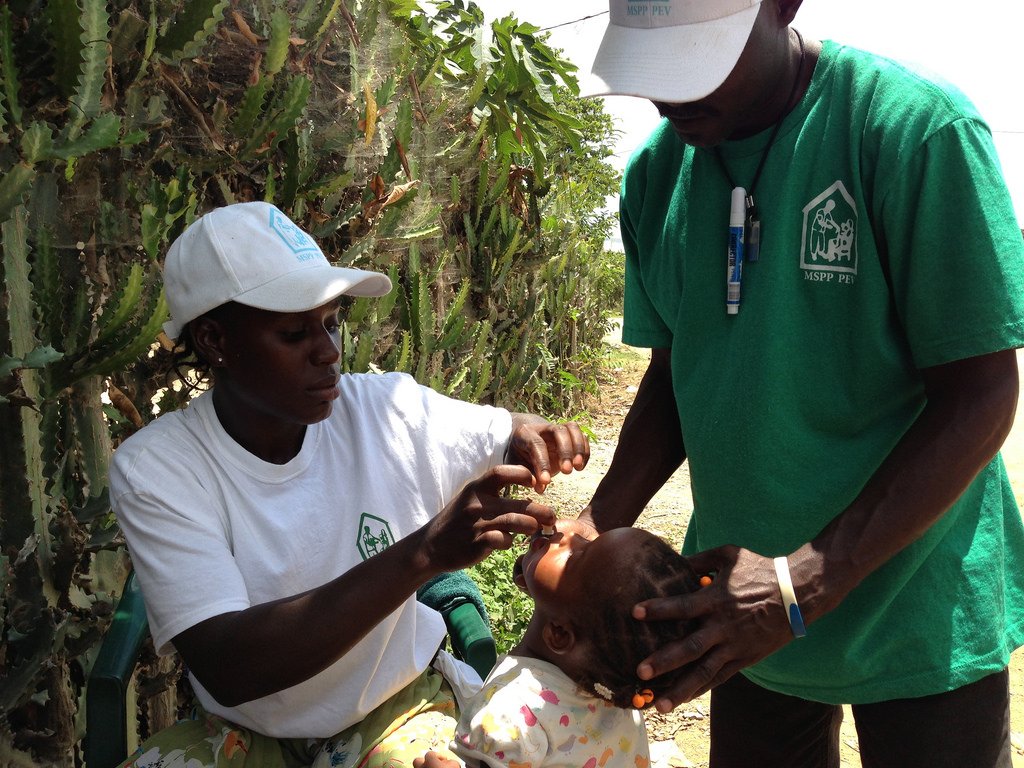Thirteen years after the entry of the UN Stabilization Mission in Haiti (MINUSTAH), the UN peacekeeping force has pulled out of the country, leaving behind a plague of injustice. Speakers at the session entitled “Advancing Global Health Justice: Lessons from the Haiti Cholera Epidemic” at the Canadian Conference for Global Health, shed light on the United Nations’ role in the worst modern-day cholera epidemic the world has ever seen. Beatrice Lindstrom, Junia Barreau, Loune Viaud, and Stephen Lewis asserted the need for stimulating international pressure and increased funding to strengthen promised response measures, which to date have been woefully inadequate.
There exists consensus in the scientific community that Nepalese UN peacekeepers introduced cholera to the country in 2010. This was due to a lack of pre-departure screening whilst there was a cholera outbreak in Nepal, and because the base where the peacekeepers resided discarded untreated human waste into a river that was a primary water source for tens of thousands of Haitians. The consequence of this negligence was the death of approximately 10,000 people, and the illness of more than 800,000.
Each speaker noted that it was six years into the epidemic before former UN Secretary General Ban Ki Moon accepted moral responsibility on behalf of the international agency, for not doing enough to help the Haitian people in the aftermath of the outbreak. Still, the UN has yet to accept legal culpability for introducing cholera to the country.
Stephen Lewis described the UN’s abandonment of legal responsibility as “an astonishing betrayal of the principles of public health and the Sustainable Development Goals.” In a statement on October 25th 2016, Philip Alston, the independent UN Special Rapporteur on Extreme Poverty and Human Rights, similarly proclaimed that it undermines UN credibility, and instils “a double standard which exempts the UN itself from having to respect human rights.”
Following a public apology by the UN, Ban Ki Moon established a “New Approach to Cholera in Haiti,” whereby a Multi-Partner Trust Fund was formed to raise $400 million in voluntary contributions from governments, non-profits, private sector partners, and individuals. The intention was to have $200 million go towards cholera control and response efforts (e.g. treatment, vaccination, improved water and sanitation infrastructure, etc.), and the other $200 million to providing material assistance to those affected by the disease. However, according to Beatrice Lindstrom, staff attorney at the Institute for Justice and Democracy in Haiti, a mere 3% of this target has been raised thus far.
In April 2017, current UN Security General António Guterres proposed that Member States voluntarily redirect their share of the $40.5 million in unencumbered funds from MINUSTAH to contribute to these efforts. Alas, only a handful of Member States have stepped up to do so, and the amount of money currently in the Trust Fund remains shallow.
Conference speakers credited this to “bureaucratic paralysis.” They noted that if the UN were to admit legal responsibility as opposed to only moral responsibility for the cholera outbreak, the response would be incorporated into the UN budget. The funding would then be drawn from ‘assessed contributions’, which are those payments required of Member States in order to be a member of the organization, and are based on their wealth and population. In this way, all Member States would contribute to redressing the consequences of the UN’s actions, as opposed to relying on voluntary contributions where only a small number of governments and organizations are inflating the Trust Fund. Thus, while the two-track plan offers tremendous potential, voluntary contributions are doomed to fall short of the $400 million target.
The good news, according to Stephen Lewis, is there is something we can all do to push the Haiti cholera response onto the global agenda.
To all individuals:
- Approach members of the Opposition who are critics of the UN response to the cholera outbreak, and encourage them to push forward the debate at the House of Commons.
- Submit advocacy pieces to media sources, in order to inform the general public of the injustices on the Haitian people, and put pressure on policy makers to act.
- For attendees at the 2017 UN Peacekeeping Defence Ministerial conference, request a meeting with Minister Freeland (Foreign Affairs) and Minister Bibeau (International Development) to encourage Canada to take leadership in the Haiti response.
Furthermore, speakers called on Canada to take leadership, to spark a cascade of action among the international community, and pointed out why Canada is well positioned to do so:
- Canada’s Ambassador to the UN, Marc-André Blanchard, is highly regarded by the international community.
- Canada is currently bidding for a two-year seat on the UN Security Council for 2021, and taking a principled position on Haiti would bode well on Canada’s behalf.
- Haiti is the largest beneficiary of Canada’s development assistance in the Americas, and there is a long history of Canada-Haiti relations.
- As one of the top 10 financial contributors to UN peacekeeping operations via assessed contributions, Canada is well positioned to take a greater stance on leveraging assessed contributions to strengthen the cholera response.
Beatrice Lindstrom reminded us that social and economic justice for Haiti means issuing a public apology on behalf of the UN, which they have somewhat done by accepting moral but not legal responsibility; providing compensation for the individuals and communities to whom have fallen victim to cholera; and investing in cholera treatment and elimination. Only then can we reorient ourselves towards upholding the principles of public health, reducing health inequities, and rebuilding progress towards the Sustainable Development Goals.
While it is too late to right the wrongs imparted on the Haitian people, it is not too late to show global solidarity, to improve conditions for the future, and to uphold justice for those who have most certainly been left behind.

